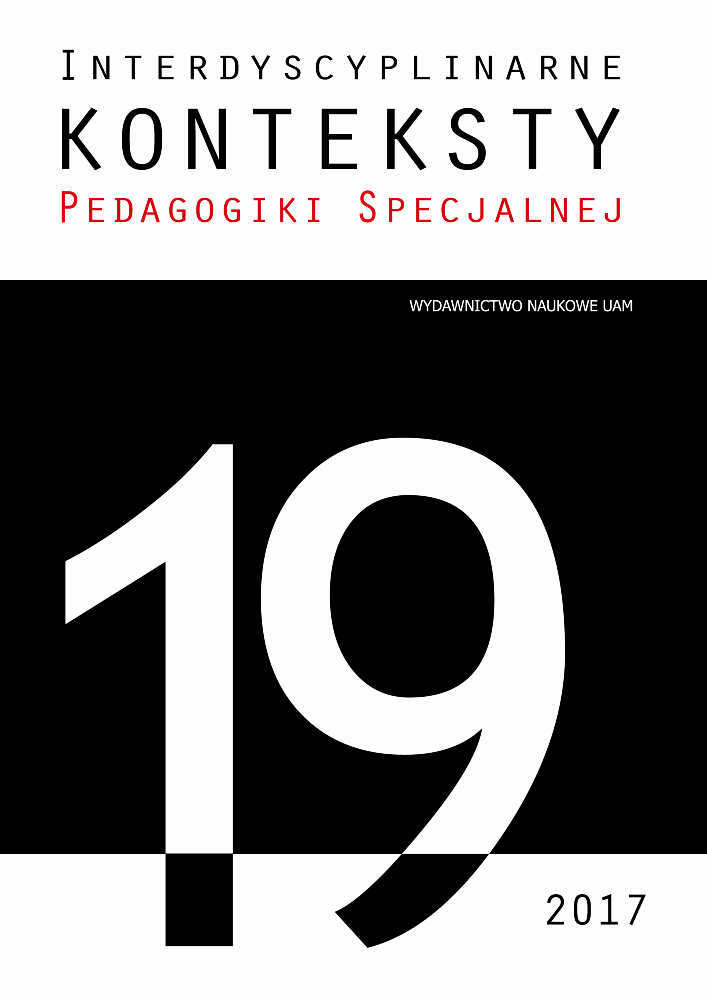Abstrakt
The purpose of this study was to gather data from the mothers of children with Tourette Syndrome (TS), in order to examine the extent to which the existence of a child with TS in the family affected mothers’ Quality of Life (QOL). The research was conducted according to the qualitative methods. Data was collected from semistructures interviews with 50 mothers of children with TS. The interviews were analyzed using a content analysis method. Conclusions derived from the research findings found that lack of accurate diagnosis and information leaded mothers to a state of imbalance and great stress. When they were given accurate information, they seemed to be more able to advocate for the child with TS and thus preventmisunderstandings, and consequent unpleasant situations and confusion.
Bibliografia
Abbeduto L. et al., Psychological Well-Being and Coping in Mothers of Youths with Autism, Down Syndrome, or Fragile X Syndrome. American Journal on Mental Retardation, 2004, 109, p. 237–254.
Abelson J.F. et al., Sequence Variants in Slitrk1 are Associated with Tourette’s Syndrome, Science, 2005, 310(5746), p. 317–320.
Albin R.L., Mink J.W., Recent Advances in TS research. Trends Neuroscience, 2006, 293, p. 175–182.
Bowen, M., Family Therapy in Clinical Practice. Jason Ahronson, Northvale, NJ, 1978.
Brown I. et al., FQOL: Canadian Results from an International Study. Journal of Developmental and Physical Disabilities, 2003, 153, p. 209–230.
Calman K.C., Quality of Life in Cancer Patients: An Hypothesis. Journal of Medical Ethics, 1984, 10, p. 124–127.
Carter D.A. et al., Social and Emotional Adjustment in Children Affected with Gilles De La Tourette’s Syndrome: Associations with ADHD and Family Functioning. Journal of Child Psychology and Psychiatry and Allied Disciplines, 2000, 41, p. 215–223.
Diener E., Lucas R.E. (1997), Personality and Subjective Wellbeing, [in:] Hedonic psychology: Scientific perspectives on enjoyment. suffering and well-being. eds
D. Kahneman, E. Diener, N. Schearz, Russell Sage Foundations, New York, 1997.
Dreher N. What is Tourette Syndrome? Current Health, 1997, 23, p. 21.
Duvdevani A., Hovav M., Rimmerman A., Ramot A., Parenting and developmental disability in Israel, Magnus Press, Jerusalem 1997.
Ganos C., Bongert J., Asmuss L. et al., The Somatotopy Of Tic Inhibition: Where and How Much? Mov Disord. 2015, 5(9), p. 1184–1189.
Garcia S.B., Perez A.M., Ortiz A.A., Mexican-American Mothers’ Beliefs about Disabilities: Implications for Early Childhood Intervention. Remedial & Special Education, 2000, 21, p. 90–102.
Greene R.W., The explosive child: A new approach for understanding and parenting easily frustrated chronically inflexible children. New York, NY, 1996. Available from the Tourette Syndrome Association, Inc. 42–40 Bell Blvd., Suite 205 Bayside, NY 11361–2820.
Haerle T., ed. Children with TS: A parent’s guide. Woodbine House, Rockville, MD, 1992.
Halpern A.S., Quality of Life and Conceptual Framework for Evaluating Transition Outcomes. Exceptional Children, 1993, 596, pp. 486–498.
Kersh J., Hedvat T.T., Hauser-Cram P., Warfield M.E., The Contribution of Marital Quality to The Well-Being of Parents of Children with Developmental Disabilities. Journal of Intellectual Disability Research, 2006, 50, p. 883–893.
Kreppner K., Lerner R., Family systems and the Life Span Development: Issues and Perspectives, [in:] Family Systems and Life-Span Development. eds. K. Kreppner, R. Lerner, Laurence Erlbaum, Hillsdale, New Jersey, 1989.
Matsuda N. et al. Self-Initiated Coping with Tourette’s Syndrome: Effect of Tic Suppression on QOL. Brain Development, 2016, 38(2), p. 233–41.
Pavot W., Diener E., Review of Satisfaction with Life. Psychological Assessment, 1993, 5(2), p. 164–172.
Piacentini J., Bergman R.L., Keller M., McCracken J.T., Functional Impairment in Children and Adolescents with Obsessive-Compulsive Disorder. Journal of Child and Adolescent Psychopharmacology, 2003, 13, Supplement 1, p. 61–69.
Olsson M.B., Hwang C.P. (2001) Depression in Mothers and Fathers of Children with Intellectual Disability. Journal of Intellectual Disability Research, 2001, 45, p. 535–543.
Oppenheim A. (1992), Questionnaire Design, Interviewing and Attitude Measurement, Pinter, London 1992.
Ouellette-Kuntz H., McCreary B., Quality of Life Assessment for Persons with Severe Developmental Disabilities, [in:] Quality of Life in Health Promotion and Rehabilitation. eds. R. Renwick, I. Brown, M. Nagler, Sage Publications, Thousand Oaks, CA, 1996, p. 268–278.
Ortiz D., Greene J., Research Design: Qualitative, Quantitative and Mixed Methods Approaches. Book Review on line. Qualitative Research Journal, 2007, 6(2), p. 205–207.
Quality of Life Research Unit, An overview of the Quality of Life Research Unit, University of Toronto. Department of Occupational Therapy Centre for Function and Well-Being, University of Toronto 2001. Available at: http://www.utoronto.ca/qol/unit.htm (accessed: 1.6.2010).
Rapoport R., Rapoport R.N. (1969), The Dual Career Family: A Variant Pattern and Social Change. Human Relations, 1969, 22(1), pp. 3–30.
Ricci L.A., Hodapp R.M. (2003), Fathers of Children with Down’s Syndrome Versus Other Types of Intellectual Disability: Perceptions, Stress, and Involvement. Journal of Intellectual Disability Research, 2003, 47, p. 273–284.
Robertson M., Baron-Cohen S. (1995), Tourette syndrome: The facts. Oxford University Press, Oxford 1995.
Robertson M.M., Trimble M.R., Lees A.J., The Psychopathology of the Gilles De La Tourette Syndrome. British Journal of Psychiatry, 1988, 152, pp. 383–390.
Robertson M.M., Tourette Syndrome, Associated Conditions and the Complexity of Treatment. Brain, 2002, 123, p. 425–462.
Ryan S.D., Gates M.S., Inclusion of Social Subsystem Issues in IT Investment Decisions: An Empirical Assessment. Information Resources Management Journal, 2004, 17(1), p. 1–18.
Shimberg E.F. (1995), Living with Tourette Syndrome. Simon and Shuster, N.Y., 1995.
Swain J., Scahill L., Lombroso P., King R., Leckman J., Tourette Syndrome and Tic Disorders: A Decade of Progress. Journal of the American Academy of Child and Adolescent Psychiatry, 2007, 46(8), p. 947–968.
Wanless R.L., Fortier L.M., Family Crisis Following the Diagnosis of a Handicapped Child, [in:] Parenting and developmental disability in Israel, eds. A. Duvdevani, M. Hovav, A. Rimmerman, Ramot, Parenting and developmental disability in Israel. Jerusalem: Y. L. Magness Pres, 1997.

